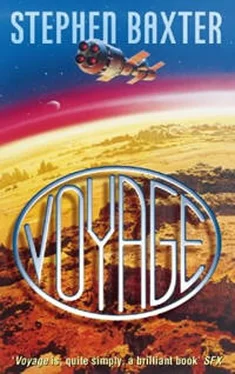In the Voyage time line, Nixon withdraws this statement before publication; after this crux point, history diverges decisively.
Even after Nixon’s response to the STG, the future of U.S. manned spaceflight was far from assured. To save funds for future programs, on September 2, 1970, Paine cut two more Apollo missions. Paine was out of place in the Nixon administration, and he resigned on September 15.
Congressional critics still wanted more of NASA’s budget trimmed. The familiar partially reusable Shuttle concept emerged in response to the need to halve development costs. But even this did not win automatic approval. In November 1971 the new NASA Administrator, James Fletcher, sent a testy memo to the President arguing that the U.S. could not afford to forgo manned spaceflight altogether, that the shuttle was the only meaningful new program that could be accomplished on a modest budget, and not starting the Shuttle would be highly damaging to the aerospace industry.
But Fletcher did not know that NASA had gained a powerful ally inside the administration in Caspar Weinberger, Deputy Director of the Office of Management and Budget, who wrote to Nixon on August 12, 1971, in support of the Space Shuttle (not of a Mars program!). NASA’s budget was still under threat simply because it was cuttable, Weinberger said. Further NASA cuts would confirm “that our best years are behind us, that we are turning inward, reducing our defense commitments, and voluntarily starting to give up our superpower status and our desire to maintain world superiority.” In a handwritten scrawl on the memo, Nixon added, “I agree with Cap.”
In December 1971 Fletcher learned that Nixon had decided in principle to go ahead with the Shuttle. The decisive factors were the arguments put forward in Weinberger’s and Fletcher’s memos, the fact that so many high-technology programs had already been cut, and — given the decision already to cancel the proposed Supersonic Transport (SST) project — the desire to start some new aerospace program that would avoid unemployment in critical states in the 1972 election year.
On January 5, 1972, Nixon issued a statement announcing the decision to proceed with the development of “an entirely new type of space transportation system designed to help transform the space frontier of the 1970s into familiar territory, easily accessible for human endeavor in the 1980s and ’90s…”
So ended the tortuous post-Apollo decision-making process. In January 1972 Nixon initiated the Shuttle project, not a Mars program.
Mars was lost. But so, nearly, had been the Shuttle — the last, compromised, element of the STG’s grand vision — and with it, the U.S. manned space program.
In the pages of Voyage, the survival of President Kennedy in 1963 pushed history onto a track which diverged from our own trajectory: slowly, but sufficiently far, in the end, for the U.S. space program to reach out to Mars. The decision-making points depicted in Voyage closely parallel those in our own world. It could — with a small perturbation — have happened like this.
But even if the argument for Mars had been “won” in 1969, it would have been essential to maintain a supportive coalition of political forces behind a Mars program over the years, or decades, it would have taken to implement it — a period during which downward pressure on NASA’s budget was consistent. To reach Mars, NASA would have needed a Fred Michaels: another Webb — not another Paine.
And in many ways, an Apollo-style Mars program could have been a mixed blessing.
As Nixon foresaw, if the Mars program had come about, NASA would have been able to remain a one-shot, “heroic” agency, rather than move to the organizational maturity for which current Administrator Dan Goldin is still reaching. On the science side, Apollo dominated other space programs in the 1960s — often to their detriment. The Lunar Orbiter and Surveyor lander programs were effectively downgraded to serve as mappers for Apollo. Perhaps, if the Mars option had been followed, Viking might have been compromised in a similar fashion, and unrelated programs — such as the unmanned exploration of the outer planets — might have been put under even greater funding pressure.
On the other hand, the abandonment of Mars and NASA’s other great plans did not free up funds for other projects; the funds simply did not make themselves available at all. If a Mars program had gone ahead, it would surely have brought many benefits in its wake, such as the need for the U.S. to build up expertise in orbital assembly and long-duration missions.
And in the end, we cannot help but regret the loss of the great spectacle we should have enjoyed had Natalie York walked on Mars at Mangala Vallis in 1986.
Stephen Baxter
Great Missenden
October 1996
Конец ознакомительного отрывка
Купить книгу












